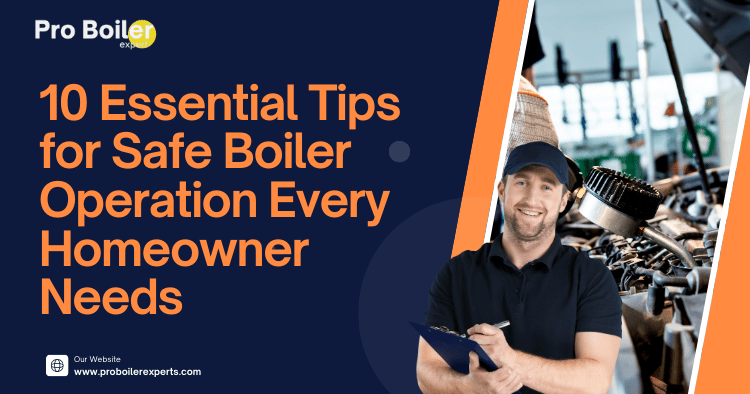Table of Contents
- Understand Your Boiler Type
- Regular Maintenance is Key
- Install Carbon Monoxide Detectors
- Know the Signs of Boiler Trouble
- Keep the Area Around Your Boiler Clear
- Follow Manufacturer Instructions
- Check the Pressure Regularly
- Be Mindful of Water Quality
- Educate Your Family
- Hire Qualified Professionals
1. Understand Your Boiler Type
Understanding your specific boiler type—whether it’s a system boiler, combi boiler, or conventional boiler—is crucial for safe operation. Each type has unique features and maintenance requirements. For example, system boilers are designed to provide hot water directly from the system without the need for a separate hot water tank, while conventional boilers require more extensive piping.
Knowing your boiler type can help you make informed decisions about maintenance and repairs, ultimately ensuring safer operation.
2. Regular Maintenance is Key
Regular maintenance is essential to ensure your boiler operates safely and efficiently. Schedule annual check-ups with qualified technicians to prevent minor issues from escalating. A dedicated maintenance checklist includes:
- Checking for leaks
- Inspecting flue and vents
- Cleaning burners and heat exchangers
- Testing safety features
For insights into maintaining various boiler types, consider visiting this guide on boiler maintenance.
Consistent maintenance not only prolongs the life of your boiler but also enhances its efficiency, saving you money in the long run.
3. Install Carbon Monoxide Detectors
Carbon monoxide (CO) is a deadly gas produced by malfunctioning boilers. Install CO detectors near sleeping areas and on every floor of your home. Regularly check the batteries and replace the detectors every 5-7 years as recommended.
Quick Tip: If the alarm sounds, evacuate immediately and contact emergency services!
Carbon monoxide is odorless and colorless, making it particularly dangerous. Always prioritize the installation of CO detectors in your home.
4. Know the Signs of Boiler Trouble
Stay vigilant for signs of boiler trouble, which can indicate serious issues. Common warning signs include:
- Unusual noises (banging, whistling)
- Fluctuating water temperatures
- Yellow or orange pilot lights (indicating incomplete combustion)
If you notice these symptoms, reach out to a professional for an inspection. For more detailed troubleshooting, check the article on common boiler issues.
Acting promptly on warning signs can prevent more serious and costly repairs down the line. Don’t ignore the symptoms!
5. Keep the Area Around Your Boiler Clear
Maintaining a clear area around your boiler is vital. Ensure that no clutter or flammable materials are present. This promotes better airflow and easier access for maintenance. Store cleaning agents and other chemicals away from the boiler to minimize fire hazards.
A tidy space around your boiler not only improves safety but also allows technicians to perform maintenance more effectively.
6. Follow Manufacturer Instructions
Always adhere to the manufacturer’s operational guidelines. Familiarize yourself with the manual to understand how to operate your boiler, adjust pressure, and perform emergency shut-offs. This knowledge can be crucial in maintaining a safe heating environment.
Manufacturer instructions are designed to ensure your safety. Take the time to understand them fully.
7. Check the Pressure Regularly
Monitor your boiler’s pressure gauge, which should typically read between 1 and 1.5 bar when cold. If it’s outside this range, consult your manual for guidance on adjusting the pressure or contact a professional.
| Pressure Range | Action Needed |
|---|---|
| Below 1 bar | Repressurize the system |
| Above 1.5 bar | Release some water |
Regular pressure checks are a simple yet effective way to maintain your boiler’s efficiency and safety.
8. Be Mindful of Water Quality
The water quality in your boiler system can greatly affect its performance. Hard water can lead to limescale buildup, which reduces efficiency. Consider installing a water softener if you live in an area with hard water. Regularly check and replace the system water as necessary.
Investing in water quality can save you from future costly repairs due to limescale damage.
9. Educate Your Family
Educating your family about boiler safety is crucial. Ensure everyone knows the boiler’s location, how to operate it, and what to do in emergencies. Awareness can prevent panic and ensure prompt action in critical situations.
Family education is a proactive step in ensuring safety. Everyone should be prepared for an emergency.
10. Hire Qualified Professionals
Always engage qualified and registered professionals for installation, maintenance, and repairs. Look for engineers who are Gas Safe registered in the UK or hold equivalent certification elsewhere. Professional assistance ensures that your boiler operates safely and efficiently.
Attempting DIY repairs can be dangerous. Always trust qualified professionals with your boiler’s care.
FAQs
What should I do if I smell gas?
If you detect a gas smell, turn off your gas supply immediately, evacuate the area, and contact your gas supplier or emergency services.
How often should I service my boiler?
It’s advisable to service your boiler at least once a year for optimal safety and efficiency.
Can I perform maintenance on my boiler myself?
Basic checks like monitoring pressure and keeping the area clear can be done by homeowners, but it’s best to leave comprehensive maintenance and repairs to professionals.
Conclusion
Safe boiler operation is essential for the comfort and security of your home. By following these ten essential tips, you can ensure that your boiler runs efficiently and safely. Regular maintenance, environmental awareness, and proper education are key components of maintaining a safe heating system.
For additional guidance, you may find helpful resources at the Health and Safety Executive regarding boiler operations and safety tips. Stay safe and warm!
Also, look for more detailed insights on specific boiler types and their maintenance in articles like Top 5 Benefits of Choosing Combi Boilers for Your Home and Top 5 Benefits of Condensing Boilers You Should Know.
Sure! Please provide the Markdown content that you would like to convert to HTML.Sure, please provide the Markdown content that you would like to convert to HTML.





